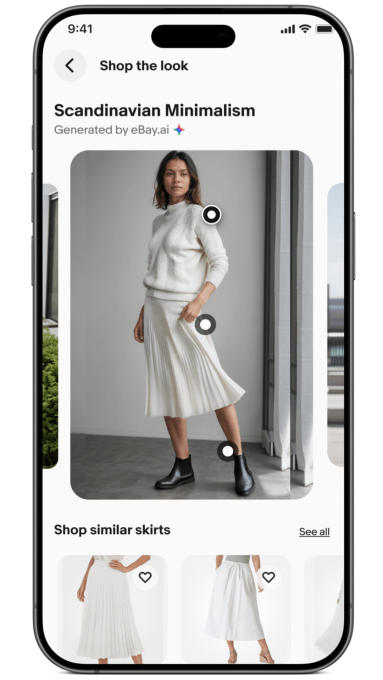eBay adds an AI-powered ‘shop the look’ feature to its iOS app
eBay on Tuesday launched a new generative AI-powered feature to appeal to fashion enthusiasts: a “shop the look” section within its iOS mobile app that will suggest a carousel of images and ideas, based on the customer’s shopping history. The company says its recommendations will be personalized to the end user and will evolve as the customer shops more. The idea is to introduce how other fashion items may complement their current wardrobe.
To do so, “shop the look” will include interactive hotspots that, when tapped, will reveal similar items and outfit inspirations, with the resulting looks including both preowned and luxury items that match the user’s personal style. The feature is powered by eBay.ai, and was developed in collaboration with the company’s Responsible AI team and RAI Principles, eBay notes.

Image Credits: eBay
“Shop the look” will appear to any eBay shopper who has viewed at least 10 fashion items over the past 180 days, the company notes. It will display both on the eBay homepage and the fashion landing page.
For eBay, the addition offers a way to showcase its wide expanse of inventory available for sale differently than before — and one that could potentially encourage more sales, if successful. eBay says it plans to explore expansions to other categories over time and will continue adding more personalization elements to the feature over the new year.
eBay isn’t the only one exploring how AI can improve the fashion shopping experience. Google last summer introduced a way for consumers to virtually try on clothes using a new AI shopping feature, for example. Amazon has also turned to AI to help customers find clothes that fit when shopping online. In those cases, the AI features were meant to help customers find the right fit or size, whereas eBay’s new feature is more focused on fashion inspiration — meaning finding the right style. That can be harder to do, given that personal style is subjective.
“Shop the look” will initially be available on iOS in the U.S. and U.K., with support for Android coming later this year.

